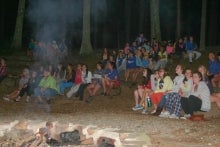Voicing “Angels”: Conveying Musical Experience at Windham Tolland 4-H Camp

On one particularly hot week this past July during the two-week stretch of time I planned to spend at Windham Tolland 4-H Camp, Connecticut experienced a series of hot, muggy, and exhausting days. A storm was scheduled to roll in and, accordingly, rest hour was extended to protect the campers in case of thunder or lightning. Lightning indeed struck, and not just from the sky. Since Heather (the camp director) was in need of some much-deserved rest, her sister J (short for Jessica) was in charge. J is incredibly good with campers and adults alike. She knows how to keep people occupied, calm, and happy, regardless of their age. Which is why you can imagine my mild panic when she left Adam (another counselor) and I with fifty or so day-campers in the sports room while she managed the overnighters as the storm was passing. Thunder was booming, lights were flickering, children were dispersing, and plastic beads were flying. I was desperately trying to reconnect a DVD player to sedate the children with mindless entertainment while Adam was on a walkie-talkie insisting that we needed immediate assistance. Fortunately, it all ended well. In response to my accusation that J had left us for hours to fend for ourselves, J maintained that she was only gone for half an hour.
So the storm hit, as did the chaos of 150 panic-stricken and/or excited campers. When the storm lifted, leaving the trees dense with fresh water and the ground heavily saturated with the much-needed sustenance, camp was as alive as ever. The extended rest and the excitement of the storm exploded in the voices of campers eager to tell one another what they did during the extended cabin time. Dinner was buzzing with conversations, songs, and the occasional spirit chant or rhythmic fist pounding over a meal of chicken Parmesan and spaghetti. Following dinner was another lively activity requiring campers to run around the campgrounds from station to station, meeting challenges and completing tasks.
I tell this story for one purpose: to juxtapose it against the highly unlikely occurrence that follows every evening program in the middle of a noisy camp settled in an otherwise lonely woods. Camp is a bustle all day, writhing with movement and bursting with sound. But at this one moment all campers cross arms and join hands, forming a ring. Not another soul wanders the grounds, swims in the lake, or searches for chocolate milk in the dining hall freezers. All energy comes to this one place, and for one moment, there is silence. Then the first voice begins the evening song “Angels” and the other campers timidly and softly sing along. This evening moment is a time of calm, of quiet, of reflection and introspection. The circle gently sways from side to side. Camper shoulders brush the waists of counselors as they collectively sing:
All night, all day, angels watchin’ over me, my Lord.
All night, all day, angels watchin’ over me.Now I lay me down to sleep,
Oh Lord, the Angels watchin’ over me, my Lord.
Pray the Lord my soul to keep,
Angels watchin’ over me.All night, all day, angels watchin’ over me, my Lord.
All night, all day, angels watchin’ over me.If I die before I wake,
oh Lord, the angels watchin’ over me, my Lord.
Praise the Lord my soul to take,
Angels watchin’ over me.All night, all day, angels watchin’ over me, my Lord.
All night, all day, angels watchin’ over me.Day is done, gone the sun,
From the lakes, from the hills, from the sky.
All is well, safely rest. God is nigh.(Spoken by individuals over humming of the melody:)
I pledge my head to clearer thinking,
my heart to greater loyalty,
my hands to larger service,
and my health to better living.
For my club, my community,
My country, and my world.YAAAAAY CAMP!
And the precious delicacy of the moment is shattered by a cacophony of young voices shouting in search of their counselors, of staff members trying to assemble their kids, of teen leaders looking for instructions for their evening training, of sneezes that had been held in until the end of the song, itches that needed immediate attention and thorough scratching. The exquisite moment collapses into a whirlwind of movement and noise that typifies the camp environment.
Soon the outdoor amphitheater was empty. All that was left was the late mist hovering after the day’s storm, the echoes of voices running through the camp grounds, and the memory of a moment when everything stopped and 150 otherwise rambunctious, boisterous kids sincerely pledged themselves to the 4-H ideals and sang about the evening angels.
Storytelling (a well-known camp tradition and crucial factor in the transmission of cultural memory at camp) seems appropriate to represent my musical camp experiences. However, smoothly merging narratives (like the one in this post) with theory in a way that satisfies standards of academic writing is a difficult task. Now as the time of grant paper writing is upon me, I face a battle between my roles as both ethnomusicologist and WT4H camper. I struggle to form a mode of presentation that conveys the zany and surprisingly emotive character of “camp-ness” and of the child psyche in an academic way. As a budding scholar, one with little fieldwork experience and an artistic impression of the world, I now find myself in a pickle. How to unite two entities that seem so dissimilar? For this reason, I am humbled by my first fieldwork experience. Though the inexplicable depth and beauty of camp have presented a stylistic challenge, I am excited to explore some creative ethnographic approaches.





